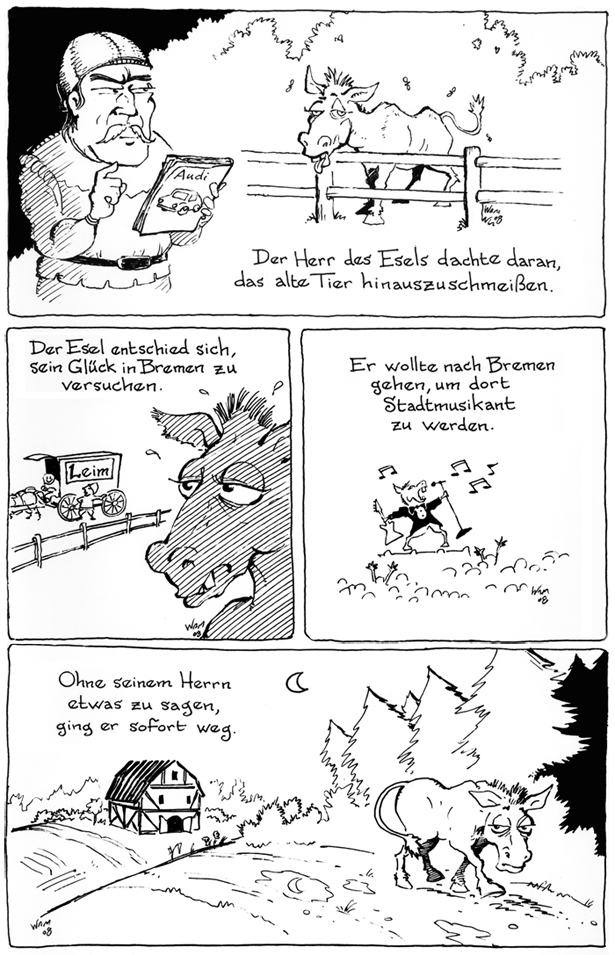7.3.1.3: Der Infinitivsatz
- Page ID
- 108482
Infinitive constructions, most typically, provide (or expand) explanations. They can be short - one or two words - or sentence-length, can be introduced by zu, um ... zu ... or by ohne ... zu ... With each of these phrases, the zu comes before the infinitive, except with separable prefix verbs, in which case it goes between the separable prefix and the stem of the verb.
In English, these constructions often carry the meaning represented by a gerund (-ing), and very closely relate to the 'to + infinitive' or 'in order to + infinitive' constructions.
If the zu, um ... zu ... or by ohne ... zu ... construction consists of more than one or two words, it is separated from the rest of the sentence by a comma.
| Der Herr des Esels dachte daran, das alte Tier hinauszuschmeißen. | The donkey's owner considered kicking him out. |
| Der Esel entschied sich, sein Glück in Bremen zu versuchen. | The donkey decided to try his luck in Bremen. |
| Er wollte nach Bremen gehen, um dort Stadtmusikant zu werden. | He wanted to go to Bremen, in order to become a musician. |
| Ohne seinem Herrn etwas zu sagen, ging er sofort weg. | Without saying anything to his owner, he took off immediately. |

Typical phrases that take zu constructions
| anfangen | Als der Esel vorbeigeht, fängt der Hund an zu weinen. | When the donkey walks by, the dog begins to cry. |
| beginnen | Der Esel beginnt, ihn zu trösten. | The donkey begins to console him. |
| bitten | Er bittet den Hund, mit ihm nach Bremen zu kommen. | He asks the dog to come with him to Bremen. |
| brauchen | Der Esel sagt ihm, dass er nicht allein zu bleiben braucht. | The donkey tells him that he does not need to stay alone. |
| drohen | Da kann sein Herr ihm nicht damit drohen, ihm das Leben zu nehmen. | There his owner can't threaten him with taking his life. |
| sich entscheiden | Die beiden entscheiden sich, dem anderen zu trauen. | They both decide to trust each other. |
| (gut/schlecht/etc) finden | Danach kommen die Katze und ein Haushahn, die es auch unmöglich finden weiter zu Hause zu bleiben. | Next come the cat and a rooster, who also find it impossible to stay at home any longer. |
| kein Geld/keine Zeit haben | Es wird bald dunkel, und die Tiere haben keine Zeit, länger unterwegs zu sein. | It is getting dark, and the four animals do not have time to continue travelling. |
| (einfach/schwer) sein | Es ist gar nicht einfach für sie, eine bequeme und sichere Unterkunft zu finden. | It is not at all easy for them to find comfortable and safe accommodations. |
| Spaß machen | Der Haushahn ist sehr alt; es macht ihm keinen Spaß, hoch in einem Baum übernachten zu müssen! | The rooster is very old; it is not fun for him to have to spend the night high up in a tree! |
| versuchen | Er versucht, sich in den Ästen hinzulegen. | He tries to lie down among the branches. |
| versprechen | Er verspricht sich selbst, nie wieder unter den Sternen zu übernachten! | He promises himself never again to spend the night under the stars! |
| vorhaben | Er hat vor, irgendwo eine kleine, gemütliche Pension zu finden. | He is planning to find himself a small, cozy guest-house somewhere. |


